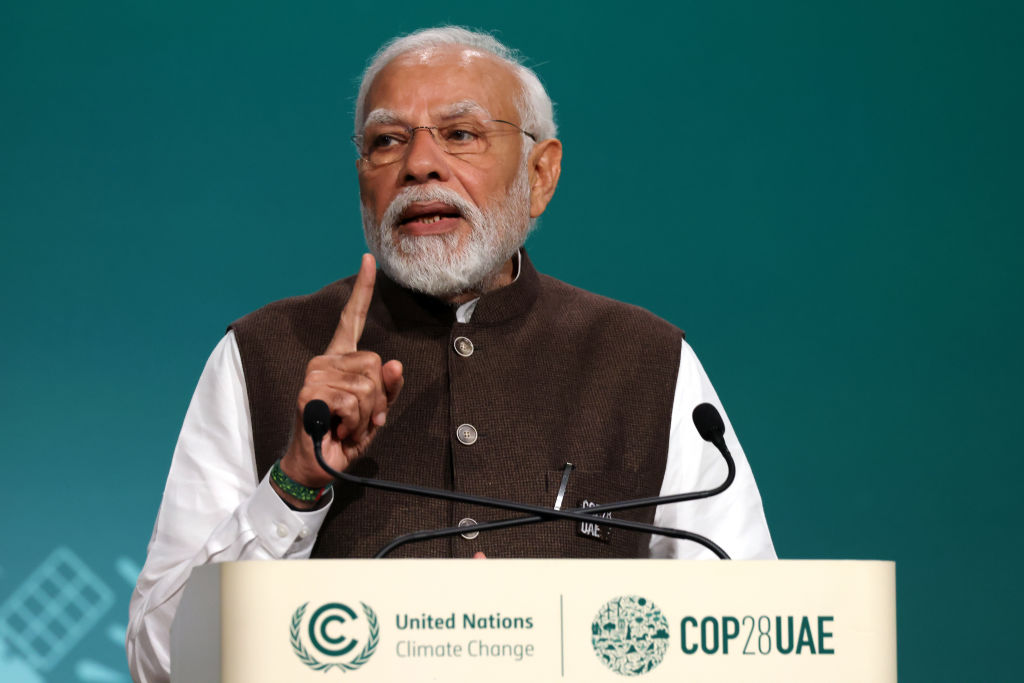- Friday, May 03, 2024
Green activists have said prime minister Narendra Modi’s Bharatiya Janata Party has attached less significance to the issues of environment and climate change compared to other Indian parties.

By: Twinkle Roy
THE Indian democracy and its biggest exercise of accommodating voices nationwide – the elections, have seen a new turn with the country’s major political parties significantly focusing on environmental issues in their election manifestos, owing to the rising concerns over environmental degradation and climate change.
While many policy experts have welcomed the trend, they also feel less optimistic claiming that governments have been seen using “lofty words” when it comes to their promises that do not reflect much on the ground, particularly when it comes to forest and wildlife conservation.
The ruling Bharatiya Janata Party (BJP), for example, has dedicated three pages to environment and climate issues under the section ‘Modi Ki Guarantee for Sustainable Bharat’, in its 69-page election manifesto, released on April 13. In the 1999 elections, for instance, it had dedicated just a paragraph to “environment”.
Read: Battle of manifestos ahead of India polls: Modi’s Guarantee vs Congress’s NYAY
The term “climate change” did not even feature in the 1999 and 2004 election manifestos of the BJP, which is currently the world’s largest political party.
The opposition Indian National Congress, on the other hand, enlisted various measures focusing on environment, climate, disaster management, and water and sanitation-related issues in two pages of its 2024 manifesto.
However, the Congress has been more consistent in emphasising on issues such as climate change and environmental sustainability.
Read: Energy companies fuel India’s political parties: report
A 2022 study by the New Delhi-based Centre for Policy Research has pointed out that the Green Old Party consistently emphasised climate change and environmental sustainability over the last three elections and even elaborated on steps to minimise climate change, like through green budgeting and the creation of an independent authority to work on it.
Even the left-leaning parties did better than the BJP by dedicating around 12 per cent of their content to environmental protection and sustainability (specifically water conservation), the study said, which is higher than the latter which dedicates about 11 per cent of its manifesto to environmental issues.
Key commitments in the BJP’s latest manifesto include achieving net-zero emissions by 2070, transitioning to non-fossil fuel energy sources, improving river health, achieving national air quality standards in 60 cities, expanding tree cover, and boosting disaster resilience.
The key commitments in the BJP’s latest manifesto include achieving net-zero emissions by 2070, transitioning to non-fossil fuel energy sources, improving river health, achieving national air quality standards in 60 cities across the country, expanding tree cover, and boosting disaster resilience.
The Congress, on the other hand, has proposed setting up a fund for a green transition and achieving the net-zero goal.
Yet, experts feel there is a lack of specific steps and these parties are not focusing on areas where actual reforms are required.
Debadityo Sinha, a senior resident fellow at Vidhi Centre for Legal Policy, Bengaluru, said the BJP’s manifesto doesn’t speak about issues that ecologists have been raising over environmental policies where larger reforms are needed.
He hoped the government would take steps to protect the existing natural forests and wildlife habitats, strengthen environmental laws, enhance the capacity of authorities, and ensure greater involvement of civil society in environmental decision-making.
Praising the former United Progressive Alliance (UPA) led by the Congress for being relatively more transparent in environmental matters, green activist and water policy expert Himanshu Thakkar said.
According to him, the UPA government was responsive to civil society, which is the biggest advocate for environmental protection and sustainability, citing the example of the shelved Ken-Betwa river interlinking project to irrigate the drought-prone Bundelkhand region that would have completely destroyed the Panna tiger reserve in the central Indian state of Madhya Pradesh and large tracts of forests.
Thakkar accused the BJP government of suppressing the voices of dissent.
“The BJP government has not done anything noteworthy on ‘Namami Gange’; the Aravallis are in a disastrous state. If more of the past is going to happen in the future, it is not going to help,” he was quoted as saying by news agency Press Trust of India.
Bhavreen Kandhari, an environmentalist working for better air quality in India, said while political parties have begun to acknowledge environmental issues, these concerns are often relegated to the lower sections of their manifestos.
“It’s crucial that environmental issues are not relegated to the bottom of the priority list, especially given the pressing concerns of air pollution and the climate crisis. This is particularly important as India is home to 83 of the 100 most polluted cities in the world. While their manifestos outline ambitious plans, the real test lies in the execution and governance, which requires strict enforcement of laws,” she said.
Environmentalists and policy experts have objected to the amendments made to the Forest Conservation Act which rendered a large tract of forests unprotected.
According to them, the Forest Conservation Rules brought in 2022 have narrowed the role of Gram Sabha, a local village administration unit, rendering its consent less significant before diverting forest land for non-forestry purposes.
“They (political parties) promise to increase the tree cover on one hand and destroy pristine forests such as the Hasdeo Aranya in Chhattisgarh for coal mining on the other. The central government diluted environmental and forest laws to help industries. This is contradictory,” Alok Shukla, convenor of the Chhattisgarh Bachao Andolan in the central state of Chhattisgarh with a large forest cover, said.
Environmental issues continue to be relegated to a secondary position in the broader political discourse, which is mostly dominated by livelihood concerns, feel experts.
(With PTI inputs)
![]()